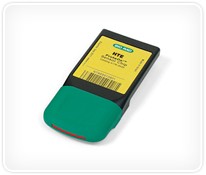
The ProteOn HTE sensor chip and associated reagent kit provide a comprehensive solution for customers using polyhistidine tags for small molecule applications. This newest addition to the ProteOn sensor chips portfolio complements the ProteOn HTG chip, used for large molecule analysis. Both sensor chips feature a novel tris-NTA surface for stable capturing of polyhistidine-tagged proteins resulting in imporved quality of label-free analysis compared to competitive approaches in the market. The tris-NTA (3-NTA) functional groups are attached to a polymer matrix layer and are activated by injection of Ni2+ ions for capturing of polyhistidine-tagged proteins.
Features and Benefits
- Higher density capture surface ideal for protein-peptide/DNA and protein-small molecule binding interaction analysis
- Improved binding capacity and stability due to the novel tris-NTA formulation
- Reduced decay of ligand over time — assures reliable results
- Capture of polyhistidine-tagged proteins directly from crude media, reducing work-up labor and sample volumes required
- Enhanced efficiency and reduced costs due to surface regeneration ability, providing many ligand-analyte interaction results on the same chip (typically >10 surface regeneration cycles are possible)
- Surface regeneration combined with the One-shot Kinetics™ technique yields exceptionally high throughput
- Full compatibility with the ProteOn XPR36 protein interaction array system
Ordering Information
| Catalog # | Description | |||
| 176-5033 | ProteOn HTE Sensor Chip, for polyhistidine-tagged protein interaction analysis, optimal for protein-peptide/DNA, protein-small molecule interactions | |||
| 176-2510 | ProteOn HTG and HTE Reagent Kit, includes sufficient reagents for >80 activation and regeneration cycles | |||
| 176-2600 | ProteOn HTE Capturing Kit, includes one ProteOn HTE sensor chip and one ProteOn HTG and HTE reagent kit | |||

